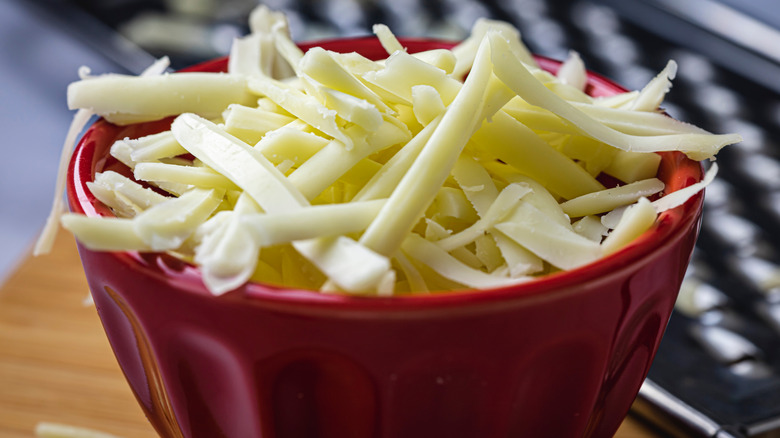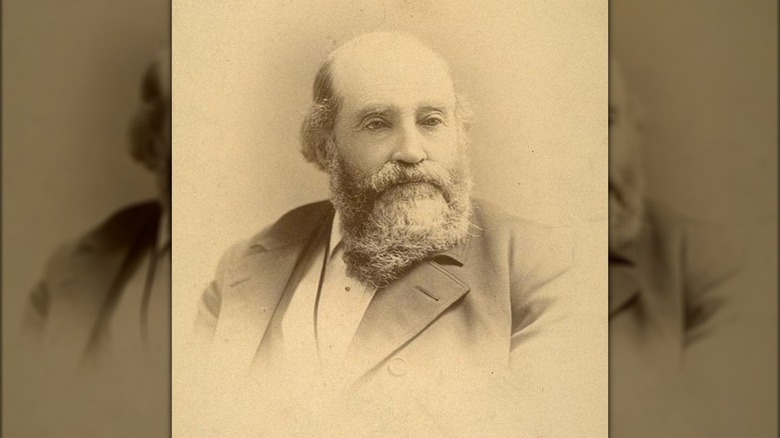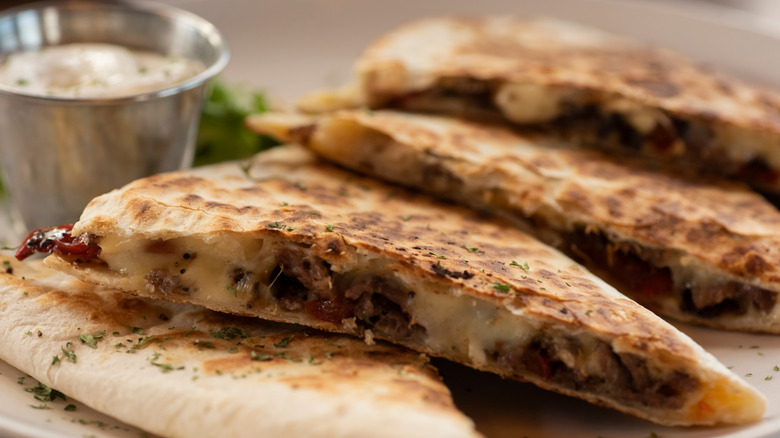Why The Origin Of Monterey Jack Cheese's Name Is So Sad
Imagine a time when California was still a part of Mexico; this is the backdrop for the story of Monterey Jack cheese. The tale of its naming takes us on a journey back to 19th-century California and to a man named David Jacks. While the cheese may be mild-mannered, its name reflects some of the ruthlessness associated with the Gold Rush and West Coast land grabs. It's both fascinating and sad.
Jacks, a Scottish Immigrant, moved to California in 1849, seeking gold and wealth. Arriving with a stockpile of firearms, he sold them to fund his venture, according to KQED. He found he didn't like gold mining (and wasn't successful at it), so he moved to the town of Monterey and started acquiring land, eventually, in effect, becoming the landlord for the city of Monterey and the many dairy farms there.
During that time, Jacks was introduced to the "queso blanco país," or country cheese made by Mexicans and Spanish dairy farmers who lived and worked throughout California. He marketed the cheese and sold it in other California communities using the name "Monterey," to reference his town. Eventually, the cheese became known as "Jack's cheese" and then Monterey Jack.
Jacks found the wealth and success marketing Monterey Jack that he didn't find mining gold. On the surface, that may sound simple, but if you look deeper into the questionable practices Jacks used to acquire land and how he took the profit and credit for Monterey Jack cheese from others, it's clear that the story of Monterey Jack is much darker and sadder than it seemed.
Was he really the Jack behind the name?
The cheese itself originated with a mild Roman cheese carried by Caesar's army. It found its way to Spain and developed into a Spanish cheese, per Monterey County Weekly. Pre-gold rush Spanish missionaries introduced the cheese, and local farmers created their own versions. Now, here's where some origin stories for Monterey Jack cheese diverge. Some say Jacks — who was always trying to increase the profits from his land, often charging exorbitant rent and taxes — took the cheese from dairy farmers he rented to, asserting that everything made on his land belonged to him, and so he was free to sell it and did so.
While many believe this story and that David Jacks is the "Jack" in the name, not everyone agrees. A competing origin story says that Dona Boronda, a Spanish-Mexican-German woman who arrived in California in the 1700s, made and sold the cheese before David Jacks. She used a vise "jack" to press the cheese, which may be the actual story behind the name. According to Atlas Obscura, she sold the cheese door to door to support her large family after her husband became disabled. David Jacks was one of her customers. He started having cheese made in the same style as Boronda's cheese and sold it in the growing San Francisco area and beyond, per the San Francisco Chronicle.
Regardless if Jacks took the cheese from Boronda or dairy farmers on his land, having bought existing farms and marketed an existing cheese, he certainly deserves none of the credit for inventing Monterey Jack.
Monterey Jack's problematic namesake
David Jacks is still well known, but fewer remember Dona Boronda or the other Monterey dairy farmers, and that is, in part, due to Jacks' immense wealth and land ownership. But he acquired that too through unscrupulous practices.
After the United States took control of California from Mexico, clashes developed between the Mexican rancheros who already living there and people who migrated west to seek fortune. The Mexican people's land grants and deeds were often challenged, resulting in expensive and lengthy legal battles, per the Library of Congress. The ranchers borrowed money to hire lawyers and fight these challenges, but the ranchers weren't always able to keep up with their loan payments, so landgrabbers would swoop in to buy their land. The Boronda family was one of these land grant families, and Jacks was one of the landgrabbers.
This is how Jacks acquired the land to run 14 dairy farms throughout the region, according to the Auburn Journal. He also gained a reputation as a "land grabber" who took advantage of indigenous people, Mexican ranchers, and the Spanish. Ultimately, the city of Monterey appeared before the U.S. Supreme Court to try and get some of its land back from Jacks, but the city was unsuccessful.
Today, the Monterey community and historians have mixed feelings about the name Monterey Jack. Though it brings broader recognition to the area, the name credits Jacks for the cheese while ignoring others, including Mexican farmers, who made it before Jacks came along.


